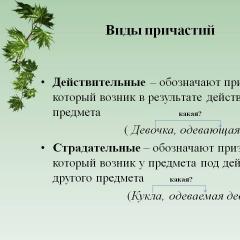Cases of nouns in Russian: a table with questions, pretexts and auxiliary words in the only and multiple number, rhymes about the case. Declination of nouns by cases: example. How to distinguish the nominative case from vinitive, viny
Studying cases and their differences.
Russian is considered one of the most complex languages \u200b\u200bof the world. Of course, anyone is hard to teach NOTOR lexicon. But, precisely because of transforming words by cases, the Slavic dialect is becoming too heavy for understanding. Yes, and many native nursery carriers are often confused in this matter, so then we will try to figure it out.
Changing nouns by cases: what is called?
Changes in existence on cases -called declining.
Declining - This is our transfiguration of words at the ending. And it is necessary for the words of each other properly fastened. Especially by the way and the statements in Russian vocabulary are obtained.
Noun - This is the component of the phrase that implies the subject. Both alive and inanimate. Therefore, gives answers to the questions assigned: who? So what?
Encompasses very extensive concepts:
- name objects (Chair, knife, book)
- designation of persons (Woman, Baby, Vegetarian)
- naming of living beings (Dolphin, Cat, Ameba)
- name of substances (coffee, gelatin, starch)
- terms of various factors and cases (fire, intermission, correspondence)
- designation of all stays, actions and properties (Floodyness, optimism, running)
There are six different cases:
- nominative
- genitive
- dative
- accusative
- instrumental
- prepositional
Cases of nouns in Russian: Table with questions, pretexts and auxiliary words in the singular
For perception and the fastest absorption of information, often allowed the table. They are perfectly shown what questions are used.
- First declination - nouns female and male clan, whose ending - A, I
- Second declination - noun male genus without endings and which are completed on a soft sign, the middle kind with the ending - Oh, e
- Third declination - these are words of female kind, which in the end finish on a soft sign


In the multiple number also, for better perception, a table is used, which is different, just ending.


Incorrect application of cases: what kind of error?
It seems that you look at the tables and examples, and everything becomes clear. And you think, but what's the difficult here? And in fact it turns out that many allow mistakes. Despite the fact that the material knows. And, as a rule, these are very common mistakes that require separate attention.
Highlight 2 main mistakes which are connected:
- with incorrect definition of noun
- with the inappropriate application of prepositions
Special attention is required to preteals:
- thanks
- according to
- contrary to
- like
- night
- narrez
IMPORTANT: These prepositions will use in a dutiful case.
For example, maneuvering according to (what?) Law. Or, thanks to (what?) Friendship with Fedorov's family.
You should also allocate a number of statements that often used in erroneous case:
- In view. The current preposition is practiced only in the Parental case. For example, in view of an excess (what?) Money.
- Such a statement as "together with" Requires an efficient case, because it has the weight of the joint action. For example, play along with (who?) Tribe.
- Also, preposition "as well as" Requests the cooling case too. For example, along with other (what?) Things.
- But after the expression "by" Advanced requests the proposed case. If there is a value "after something". For example, upon completion of the contract.
How to distinguish the nominative case from vinitive?


Every schoolboy faces such questions. Yes, and adults often get up before a similar choice. And it is not surprising that often these aspects are confused. After all, the questions of the same type and end of inanimate words Some and the same, but end of animated nouns totally different.
How the nominative case is different from the vinitive case: instruction.
- Of course, the question is.
Above the table was already a memo that the nominative is guided by questions. who? what?(as a main member of the sentence). And accusative - (see) who? what?(Minor member of the sentence). - And there is a small trick. Because Word in the nominative case will be permanently the main member in the proposal, I define the main members of the proposal - to be both faithful.
- If our word is not the main member of the sentence, therefore it stands in the vinegenous case, and will be a secondary member of the sentence.
- Another reception: Put the question to the word in animate form. For example: who? Parrot (subject to the nominative case) pecks what? (Who?) Grain (minor member of the sentence, accusatory case).
- Also, a significant role is a pretext, with which the independent part of speech is associated (or not). In the first version (nominal case), the noun always use without premisitor. But in the second (accusative case), on the contrary, more often with him ( in, on, for, through and others).
- Identify the case also contributes ending. The table above mentioned which completions from any case.
How to distinguish the accusative case from the PAID case?


- The most important assistant is the question that needs to be in mind. PEITIVE case, as you know, responds to questions whom or what not? And here is the accusative case on - see whom? I hear what?Question who? The same in both cases.
Below read the instructions.
- Mentally replace an animated object in inanimate.
- To inanimately in the parental case, the question is coming - what not? But in the vinate, an inanimate subject responds to the question what I see, I hear?
- Example: I caught ( who?) Butterfly. We put an inanimate question. I caught ( what?) Butterfly. Question what? Not suitable. So this is the accusative case.
- By the way, B. Parental case will mean attachment Someone or something. Bought a suitcase for ( what?) Trips (genitive). The bedside table is made ( of what?) From wood (genitive). Also point to a particle of something. Flower is part (what?) Plants (PAGITIVE). Or is it comparison of objects. Smartphone better ( what?) button telephone (genitive).
- It is also important that the verb in the parental case will be with negative particle. In the shop not It was ( what?) Sour cream (genitive).
- But B. conductive pad has Place spacious or intermediate cake. Define what?) Weather for tomorrow (accusative). And also, the effect goes to the object is entirely. For example, I closed ( what?) Door (accusative). I drank (what?) Milk (accusative). Or will express a desire and intention. I want to eat ( what?) Apple.
Non-closer nouns: list
It seems that all the nuances looked at and went a little clarification. But it was not there! The Russian language came up with some more traps - these are nouns that are not inclined. And here the foreigners have shock.
If quite briefly, these are foreign words (practically). But it becomes slightly clearer, then we give the list below.
- Nouns of foreign origin (own and nominal), the end of which is, -E, -Y, -Y, -Y, -And:
- highway
- interview
- flamingo.
- Again words of foreign origin. But! Feminine and with consonant end:
- madame
- Carmen
- Surnames. Russian and Ukrainian, the ending of which is being completed on-ours, their:
- Ivanchenko
- Korolenko
- Sedoy, etc.
- Well, of course, abbreviations and abbreviated words:
Declination of nouns by cases: example
Rules rules, and on the example is significantly easier perceived. To make it easier to visually, also resort to the help of the table.


How to quickly learn case and their questions?
In principle, there is nothing complicated. If it is good to figure and penetrate. And not only coming from other countries is hard, but also our kids. Therefore, so that the information is quickly absorbed, now what was not invented. But we were taught in school years, put a book under the pillow. And, most importantly, acted! I read before bedtime, I slept all night on the book and I already remembered everything.
- Of course, many teachers resort to the help of risks or games. But parents should help their Chadam in this matter.
- First of all - you need to remember how much cases. They are only 6.
- And then, on the most common and domestic examples, explain to the child to which issues a noun is responsible for. So, it is easier to determine the case.
- The most important thing is the practice! We took the child from the school and eat on the bus. Forward! Practice in the words that see. Although on the bus.
- By the way, a small sample of light poem. He and kids will like, and it will be assimilated to assimilate training information.














The poem about the case: Ivan gave birth to the girl, ordered to drag the diaper
This poem all parents can repeat the choir. After all, he remembered, as "twice two". And most importantly, he is easy for children in perception.
- Ivan (and - nominative)
Gave birth (p - genitive)
Girl, (D - Calculation)
Ordered (in - accusative)
Cheat (t - cool)
Diaper (P - proposed)
Video: How easy to learn case? Simple learning technique


